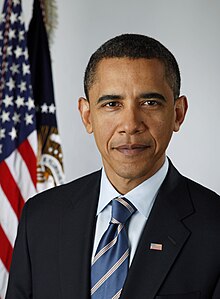Obama declares tougher emission targets before Copenhagen summit
Sunday, November 29, 2009

Barack Obama has set tougher emission targets in a White House speech. He said, the USA intends to reduce its greenhouse gas emissions "in the range of" 17 percent below 2005 levels by 2020 and 83 percent by 2050. Obama will attend the Copenhagen international climate meeting next month, and is going to offer these figures as an official climate change policy.
Obama has also set interim targets for better intermediate control. These are a 30% cut by 2025 and a 42% cut by 2030. But Obama's climate change speeches aren't going very far: Mr Obama is not planning to be present at the summit during the last days, when the world leaders might most possibly finally make a treaty to replace the 1997 Kyoto Protocol.
To compare, the European Union speaks about cutting its emissions by 20% cut by 2020 and 80% by 2050. But the starting point of the EU and of most of other nations is 1990, while Obama's numbers are in terms of 2005 emissions. The plans proposed by Obama are with a steeper end compared with EU, thus making a slower start.
Emissions cuts targets
| Year | USA in terms of 2005 | USA in terms of 1990 | European Union in terms of 1990 |
| 2020 | 17% | 4% | 20% |
| 2050 | 83% | 80% | 80% |
Observers say some accumulation effect can be caused by domestic policies, which take long to implement on a proper scale, but then give a faster emissions cut. Such policies can include improvements in vehicle fuel efficiency, industries-specific limitations, etc.
The White House announcement also contains the list of US representatives at the Copenhagen conference:
- President Barack Obama
- Interior Secretary Ken Salazar
- Agriculture Secretary Tom Vilsack
- Commerce Secretary Gary Locke
- Energy Secretary Steven Chu
- Environmental Protection Agency Administrator Lisa P. Jackson
- Council on Environmental Quality Chair Nancy Sutley
- Office of Science and Technology Policy Director John Holdren
- Assistant to the President for Energy and Climate Change Carol Browner
A schedule of US Center presence was made up for certain dates in December, so that the exact ways to achieve the cuts will be discussed.
Sources
- John M. Broder. "Obama to Go to Copenhagen With Emissions Target" — New York Times, November 26, 2009
- Jim Giles. "Obama offers fixed targets for US emissions cuts" — New Scientist, November 25, 2009
- "US pledges carbon emissions cuts" — BBC News Online, November 25, 2009
- "President to Attend Copenhagen Climate Talks" — The White House Office of the Press Secretary, November 25, 2009



